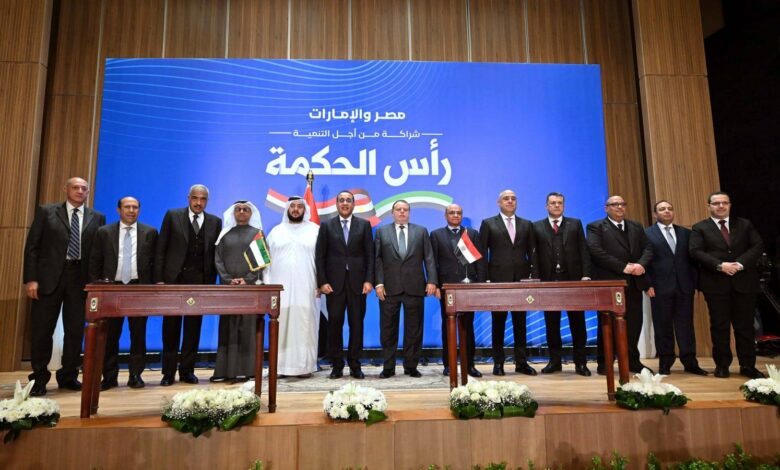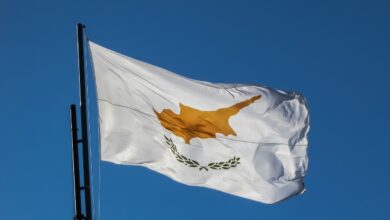
Egypt has received the first tranche of funds pledged by the UAE from a total of $35 billion.
President Abdel Fattah al-Sisi said that some of the UAE’s funds have been deposited in the Central Bank of Egypt, and an additional tranche is expected to be received on Friday.
During a televised event on Wednesday, he explained that this reflects “clear” assistance and support from the Gulf state.
This massive investment package will help to reduce the value of the currency and open the door to more international aid, Asharq Business reported.
The first tranche of funds is worth five billion dollars, and the remaining $30 billion will be transferred in installments over the next two months.
The funds are expected to help Egypt to stabilize its currency and reduce its budget deficit and to boost foreign investment and economic growth.
The UAE’s commitment gives the CBE the resources it needs to carry out the long-awaited devaluation of the currency, which will be the fourth in the country since early 2022 and perhaps the largest so far.
This is an adjustment that the International Monetary Fund has long sought to help increase Egypt’s current three billion dollar loan – of which the country has received only a small portion – to a package of more than $10 billion that could bring in further partners.
Largest deal of its kind
Egypt on Friday announced the largest major investment deal in partnership with the UAE, dubbed “Egypt and UAE, a Partnership for the Development of Ras al-Hikma.”
Egyptian Prime Minister Mostafa Madbouly said that the project includes establishing hotels, entertainment projects, tourist resorts, a financial and business district, and an international airport.
This project will be the largest of its kind, he added, as it seeks to develop a city with an area of 170 million square meters or more than 40,600 acres.
Egyptian Cabinet spokesperson Mohamed al-Hommosany assured that the state is fully committed to compensating the people of the Ras al-Hikma region, adding that not a single citizen will be harmed by this project.
During a phone interview with CBC satellite channel on Tuesday, Hommosany said that the Ras al-Hikma urban development project will witness investments of no less than US$150 billion, and provide many job opportunities.
This new city is expected to attract at least eight million tourists, he added, pointing out that the project will contribute to the development of the North Coast region.
Economic woes
In December 2022, the IMF approved a three billion dollar loan from the EFF to help Egypt cope with global challenges.
Egypt received only the first tranche of the loan because it had not yet met the Fund’s requirements for a comprehensive reform program.
The country has been in talks for months to increase the value of the loan and to complete the reviews of the second and third tranches.
The Moody’s credit rating agency earlier in January anticipated that Egypt will face significant pressures in 2024 for both debt and financial liquidity.
In its report on the Middle East and North Africa region, the agency added that it expects a further depreciation of the official exchange rate of the Egyptian pound, as indicated by prices in the parallel market.
“For reasons including currency depreciation, we expect inflation to remain very high in Lebanon, while it will register a double-digit figure in Egypt,” the report explained.
It added that a combination of “depreciation of the local currency, rising inflation, and interest rates will dampen consumption and investment in Egypt.”
Over 60 percent of revenues in Egypt will continue to be directed to interest payments in the fiscal year ending June 2024, leaving the government with very limited financial flexibility to respond to shocks – such as those arising from the clashes between Israel and Hamas in Gaza.
Egypt’s domestic debt increased by eight percent in the first quarter of 2023 to reach LE6.86 trillion ($222.18 billion), compared to LE 6.352 trillion in the last quarter of 2022, according to data from the Ministry of Planning and Economic Development back in September.
Based on the data, Egyptian external debt also rose to US$165.361 billion by the end of the first quarter of 2023, an increase of 1.5 percent compared to the last quarter of 2022, when it recorded $162.928 billion.
Crisis at the seas
The Red Sea crisis has cast a shadow over global trade, with container ships turning to sailing around Africa to avoid the region.
Huthi militants in Yemen pledged to continue targeting ships heading to Israel, despite America’s move to form Operation Prosperity Guardian, an international maritime task force, to protect the shipments.
This has resulted in a sharp decline in the movement of oil tankers through the Bab al-Mandab Strait in the Red Sea.
The Chairman and Managing Director of the Suez Canal, Osama Rabie, announced earlier in January that the number of ships passing through the Suez Canal decreased by 30 percent compared to the same period last year, owing to tensions at the Red Sea.
During a telephone interview at the time with Lamis al-Hadidi on Egypt’s “Last Word” (Kalema Akhera) television show, Rabie added that the return in US dollar also fell by 40 percent.




